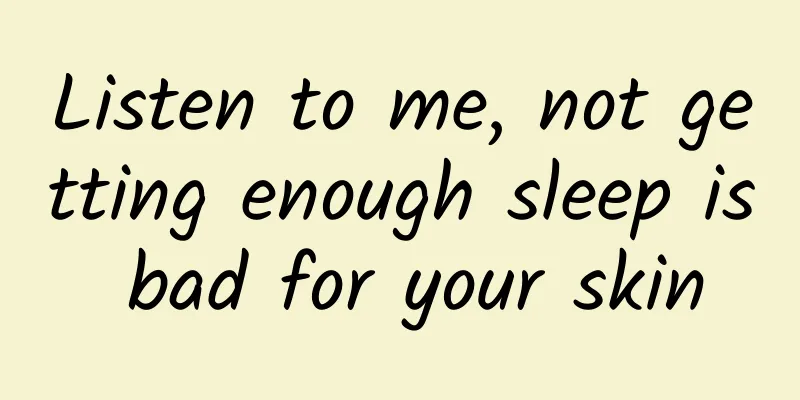Listen to me, not getting enough sleep is bad for your skin

|
You must have heard that people spend about 1/3 of their lives sleeping. However, the pace of life is getting faster and faster, and people are getting less and less sleep. The "my country Sleep Research Report (2022)" officially released in March 2022 pointed out that the overall sleep condition of Chinese residents is average, and 64.75% of people actually sleep less than 8 hours a day. In addition, the report also mentioned that people have more bad sleep concepts and behaviors, and delay falling asleep. This may be related to the development of the Internet in recent years, which has led many people to habitually play with mobile phones or surf the Internet before going to bed, affecting the quality of sleep. Image source: Tuchong Creative Getting a good night's sleep is really important. It is an important basis for ensuring the quality of life. Apart from the big things, not getting enough sleep is also very unfriendly to the skin. If you don't believe it, let's read on. Less sleep, slower recovery of skin function It is not groundless that if you don’t get enough sleep, your skin’s ability to recover will be impaired. Foreign scholars have done research on this. They found two groups of people. One group had poor sleep quality and slept less than 5 hours a day, and the other group had good sleep quality and slept 7 to 9 hours a day. The researchers taped their skin for a period of time, and then removed the tape 72 hours later to measure and calculate the recovery rate of the skin barrier function. The results showed that people who slept well had a 30% higher barrier recovery rate, while those who slept poorly had a more likely skin to lose moisture. At the same time, they were all exposed to a simulated sun exposure environment (with ultraviolet rays) to make their skin red. The results showed that after 24 hours, those who slept well recovered their erythema better, significantly better than those who slept poorly. It can be seen from this that a good night's sleep is not only about getting a good rest and feeling energetic, it is also of great help to the skin's ability to repair itself. Sleep well, sleep more, and feel better subjectively The questionnaire shows that people who get enough sleep and sleep well will have a better subjective feeling, and their feelings in many dimensions are better than those who do not sleep well. Specifically, the former tend to think: Feel like you look better than your friends; Feeling younger than your actual age; Overall, I think the skin looks pretty good; I am quite satisfied with my appearance at my current age. I think my face is pretty healthy. Overall, I am quite satisfied with my skin tone. Regardless of whether these obvious differences are objectively true, getting enough sleep can make you feel better, so it’s not a bad thing, right? Less sleep can lead to more obvious signs of skin aging Another study used a tool called SCINEXA to evaluate the skin aging of volunteers who slept less and more, and then compared the scores. The results showed that people who slept more and slept well had lower intrinsic aging scores, while people who slept less and slept poorly had significantly higher scores. This suggests that if you sleep less (and sleep poorly), the signs of skin aging are more obvious. So, how do we define the so-called "endogenous aging" here? One is to see if the skin has uneven skin tone, another is to see if the skin has obvious fine lines, and the third is to see if the skin is loose and loses its firmness. In addition, if the skin fat tissue volume is lost, or if there are proliferative lesions on the skin (such as age spots), it also indicates aging. Of course, occasional, short-term sleep problems may not necessarily result in skin aging, but long-term, continuous lack of sleep and poor sleep quality may cause you to age faster than your peers. Lack of sleep, poor sleep, acne is inevitable You should be familiar with acne. Its scientific name is "acne", and it has different nicknames at different stages, such as acne and acne vulgaris. This is a common skin problem that usually occurs in adolescence and young people. Although it is mainly related to overactive sebaceous glands, excessive oil production, clogged hair follicles and bacterial infections, it also has some inseparable and complicated relationship with sleep (although this relationship may vary from individual to individual). Specifically, there are some potential connections: 1) Stress: Lack of sleep or poor sleep may increase the body's stress level (medically known as stress). Increased stress may lead to changes in hormone levels, which in turn affect skin health, including changes in sebaceous gland function. Studies have also shown that there is a correlation between stress and the severity of acne. 2) Immune function: Sleep has an important impact on the function of the immune system. If you don’t get enough sleep, it may reduce the overall immune function and make the body more susceptible to bacterial infection and inflammation. From this perspective, it may also cause or aggravate acne. 3) Inflammation: Poor sleep may actually trigger an inflammatory response, and chronic inflammation is also an important factor in acne. 4) Skin repair: We all know that sleep is a critical time for the body to repair and regenerate. Sufficient sleep can promote the repair and regeneration process of skin cells, which may indirectly help reduce acne inflammation and related damage. To sum up, I believe everyone can realize that “beauty sleep” really makes sense – sleeping well and getting enough sleep is indeed good for the skin and has a “beauty” effect. Back to the "China Sleep Research Report (2022)", the report calls on everyone to practice the "118" healthy sleep concept, that is, "go to bed at 11 o'clock and sleep for 8 hours". The purpose is to establish a healthy sleep concept and take the initiative in sleep. Finally, I wish you all a good sleep! The article is produced by Science Popularization China-Starry Sky Project (Creation and Cultivation). Please indicate the source when reprinting. Author: Tang Jiaoqing, attending physician of dermatology, doctor of medicine, popular science author Reviewer: Chen Haixu, Deputy Director of PLA General Hospital (301 Hospital) and Postgraduate Supervisor |
<<: Congratulations to Chinese scientists! New breakthroughs in 2023
>>: "Health from Food" Series | Avoid bad habits to protect your liver
Recommend
Yingke has been removed from the shelves again. Will this be a sign that it is in trouble?
The rumors of "selling out" have just s...
Unmanned freight transportation is favored by giants and may become the first scenario for autonomous driving to be implemented
The technical maturity and safety of driverless v...
4 ways to pull seed users
It’s a relatively new product and I don’t think t...
International Energy Agency: Energy Efficiency Report 2023
The International Energy Agency has released its ...
Hybrid App Development: Using WebView to Load Pages
Hybrid App is the abbreviation of hybrid mode app...
An old friend shared that a recommended job in Changsha is to drink tea and provide takeaway service. I sincerely recommend it to everyone
Changsha tea tasting is worth recommending. The s...
Misconception! 5 common misunderstandings about information flow advertising image materials, with 4 guidelines + 2 cases attached!
Introduction: This article lists five major color...
There are no marketing masters in the brand wave
Every once in a while, the popular marketing meth...
User operation, how to achieve a breakthrough from 0 to 1?
Users, as one of the most important factors in pr...
With 200 million in revenue, how did Himalaya FM Knowledge Carnival operate?
Ximalaya FM, which was launched in 2013, is an on...
Method and code implementation for detecting Android virtual machine
I just read some open source projects/articles/pa...
Mother's Day poster copywriting collection!
On Mother's Day , We are all calling for mate...
What is the handling fee of POS machine? Is it credible that there is no handling fee?
When consumers shop in offline stores, they will ...
Zhumadian Mini Program Production Company, how much does it cost to produce a voting mini program?
More and more businesses are paying attention to ...
The World’s Female Tech Community (Part 3): The Happiest Place in the World, Women and the Dark Side of Technology
This series has traveled through Africa and South...









